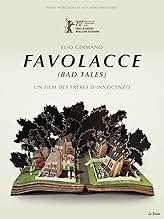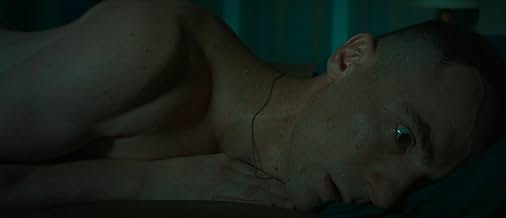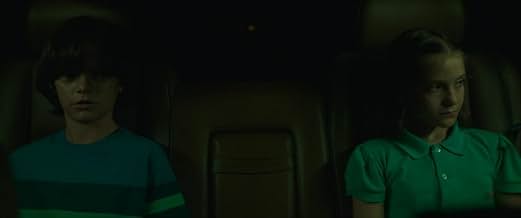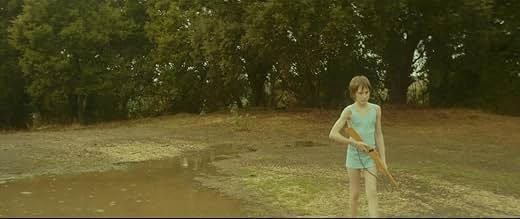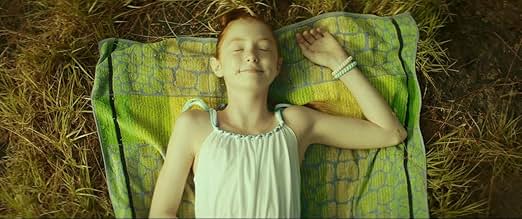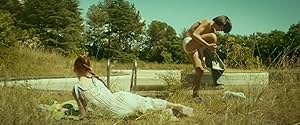CALIFICACIÓN DE IMDb
6.4/10
7.3 k
TU CALIFICACIÓN
Varias familias viven en el extrarradio de Roma. Las tensiones escalan de vez en cuando; finalmente, son los niños los que hacen que todo se colapse.Varias familias viven en el extrarradio de Roma. Las tensiones escalan de vez en cuando; finalmente, son los niños los que hacen que todo se colapse.Varias familias viven en el extrarradio de Roma. Las tensiones escalan de vez en cuando; finalmente, son los niños los que hacen que todo se colapse.
- Dirección
- Guionistas
- Elenco
- Premios
- 22 premios ganados y 28 nominaciones en total
- Dirección
- Guionistas
- Todo el elenco y el equipo
- Producción, taquilla y más en IMDbPro
Opiniones destacadas
My personal favorite of the 2020 Berlin International Film Festival and winner of the Berlinale Bear for best script. The film introduces itself as: A true story inspired by a false story. The false story is not very inspired. Sounds mysterious? It better be, for this is a film enjoyed more the less you know. Okay, I'll give you this much: a dark look at life in the subjrbs outside Rome, where people's aspiration clash with reality. The story of a summer broken down into a sequence of immersive scenes, each containing its own drama and driven by an atmosphere of suspense. All is mostly viewed through the eyes of the kids. Highly recommended! On a side note: this is the second film of the D'Innocenzo Brothers that I've seen, and it is astonishing to observe how much they've matured as film makers and story tellers. Their first film - La Terra de'l abbastanza - had all the pieces but lacked a forceful plot to tie them together. Favolacce deliverd this force, in a unique way.
It's hard to review such a title: talking about the plot might give away too much or be misleading. I'll just write my observations on the final product: not very useful for those who have to decide whether to watch it or not but well... that's it.
Despite the initial word joke about the source material, I found the story quite inspired - whether it is supposed to be true, made up, a mix, a fairy tale or whatever hermeneutical meta-perspective we are supposed to adopt. Inspired, as was the previous (and first full length) film written and directed by the D'Innocenzo brothers: "La terra dell'abbastanza". Unfortunately I found here the same problems I found there: the overall result is uneven, disjointed, a little inconsistent and often cold.
By cold, I don't mean that it lets the viewer feel the unbridgeable divide between these kids/adolescents and their parents: that divide emerges as an overall unwillingness of adults to understand (or even listen) to kids. By cold I mean that while I wasn't bored wacthing the film, I didn't care either about most of what happened to most of the characters: alienating. Among other things this is mainly due to scenes too stylized/simplistic and to the acting from the kids which - with few exceptions - is not good enough.
At times surgical in a too detached way and others indulging in irrelevant details that just stress the same buttons or feel gratuitously obscure. Finally - and in this worse than "La terra dell'abbastanza" - "Favolacce" feels sometimes inconsistent even for those willing to spend time trying to decipher the code:
Or the questions ARE the story, and we're just tricked with opaque symbols and vague happenings into believing that there's more (and in this "La terra dell'abbastanza" fared better given its plain Noir status). I don't feel like attempting to reach the "hermetic intellectual heights" of any author: for sure I won't make an exception in this case.
Still some scenes and characters magnetize the viewers' attention and alone deserve to be watched (thanks to both the direction, supporting actors like the very good Ileana D'Ambra and Barbara Chichiarelli and/or the writing).
Surely I won't miss D'Innocenzos' next work: yet - and I'm really unsure which one - I would suggest to the authors to work together with a better screenplayer, a better director or both.
Despite the initial word joke about the source material, I found the story quite inspired - whether it is supposed to be true, made up, a mix, a fairy tale or whatever hermeneutical meta-perspective we are supposed to adopt. Inspired, as was the previous (and first full length) film written and directed by the D'Innocenzo brothers: "La terra dell'abbastanza". Unfortunately I found here the same problems I found there: the overall result is uneven, disjointed, a little inconsistent and often cold.
By cold, I don't mean that it lets the viewer feel the unbridgeable divide between these kids/adolescents and their parents: that divide emerges as an overall unwillingness of adults to understand (or even listen) to kids. By cold I mean that while I wasn't bored wacthing the film, I didn't care either about most of what happened to most of the characters: alienating. Among other things this is mainly due to scenes too stylized/simplistic and to the acting from the kids which - with few exceptions - is not good enough.
At times surgical in a too detached way and others indulging in irrelevant details that just stress the same buttons or feel gratuitously obscure. Finally - and in this worse than "La terra dell'abbastanza" - "Favolacce" feels sometimes inconsistent even for those willing to spend time trying to decipher the code:
- who is this narrator that talks like columnists (and screenplayers..) write, finds quite an intellectual's hobby, but has the most unrefined and boorish accent of the film?
- are we supposed to (re-)read "the Canterville Ghost" to LOVE the movie?
- are we supposed to listen again and again to the badly pronounced/registered dialogues to not miss what's said?.
- are we supposed to give our own answers to these and all the other questions that arise watching this "fable"?
Or the questions ARE the story, and we're just tricked with opaque symbols and vague happenings into believing that there's more (and in this "La terra dell'abbastanza" fared better given its plain Noir status). I don't feel like attempting to reach the "hermetic intellectual heights" of any author: for sure I won't make an exception in this case.
Still some scenes and characters magnetize the viewers' attention and alone deserve to be watched (thanks to both the direction, supporting actors like the very good Ileana D'Ambra and Barbara Chichiarelli and/or the writing).
Surely I won't miss D'Innocenzos' next work: yet - and I'm really unsure which one - I would suggest to the authors to work together with a better screenplayer, a better director or both.
This movie stages action in a domestic and familiar environment, where violence never explodes, because violence is not a disturbance of that social order, but a pillar: it's behind every gesture, every word, every thought, it's something sinister always lurking inside the grownups (in a minor but important scene, during a birthday party the adults say horrible words towards a mother - but in whispers, like if they were haunted).
Parents shows and expose their kids as trophies, not caring for them but for themselves: in another scene a young father is pleased by the driving skills of his own son and proudly screams "You are like me!" - something that the kid is obviously not willing to be. Generations basically ignore each other's feeling: and ignorance is the trigger of silence, silence is the trigger of despair, and despair the trigger of violence.
Thanks to silence, conflict is invisible, and for this reason it becomes eventually inescapable: and the surprising epilogue is the only moment when peace is restored in the families, as the parents for the first time looks like they are actually caring for their children. We hear from the narrator at the beginning that everything in this story is at the same time true and false: and eventually we understand that this mix creates a scaring thing, called reality. This movie is good cinema and great advice, you should see it.
Parents shows and expose their kids as trophies, not caring for them but for themselves: in another scene a young father is pleased by the driving skills of his own son and proudly screams "You are like me!" - something that the kid is obviously not willing to be. Generations basically ignore each other's feeling: and ignorance is the trigger of silence, silence is the trigger of despair, and despair the trigger of violence.
Thanks to silence, conflict is invisible, and for this reason it becomes eventually inescapable: and the surprising epilogue is the only moment when peace is restored in the families, as the parents for the first time looks like they are actually caring for their children. We hear from the narrator at the beginning that everything in this story is at the same time true and false: and eventually we understand that this mix creates a scaring thing, called reality. This movie is good cinema and great advice, you should see it.
It's a good movie. Plot is well worked but they didn't really make the best of it. Dialogues are solid. All together it's a good movie but not as good as it could've been.
This Italian Swiss TV coproduction with Sky TV won a screenplay award at the Berlin Film Festival. We saw it in a group of cinephiles. In the discussion afterwards we could not find one reason how this could have been possible. Maybe every other film in the contest was written worse, but that is hard to imagine. Maybe the jury wanted to play a practical joke. Even the narrator in the film apologizes for the senslessness and boredom of these random and badly written script. Any of the scenes could have been replaced with any other. It makes no difference. It was sad to witness how the art of film has deteriorated both in the making and in a venue of appreciation that once held some prestige. Nice cinematography though, one star for that and one for casting.
¿Sabías que…?
Selecciones populares
Inicia sesión para calificar y agrega a la lista de videos para obtener recomendaciones personalizadas
- How long is Bad Tales?Con tecnología de Alexa
Detalles
Taquilla
- Presupuesto
- EUR 2,000,000 (estimado)
- Total a nivel mundial
- USD 208,419
Contribuir a esta página
Sugiere una edición o agrega el contenido que falta

Principales brechas de datos
By what name was Queridos vecinos (2020) officially released in India in English?
Responda
![Ver Trailer [OV]](https://m.media-amazon.com/images/M/MV5BZDVkZjQxODYtZjllYi00ZTU4LWEyZTctN2Q5YWYwZDljNjA0XkEyXkFqcGdeQXRyYW5zY29kZS13b3JrZmxvdw@@._V1_QL75_UX500_CR0)


